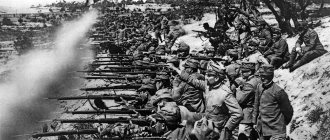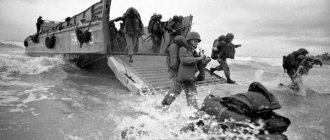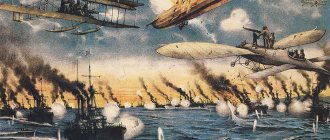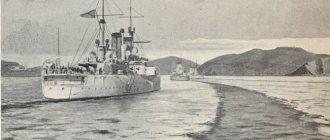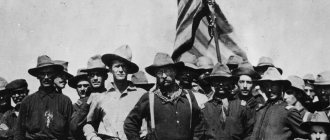Political situation in the Balkans at the beginning of the 20th century
Since the mid-15th century, the Balkan Peninsula was part of the Muslim Ottoman Empire, but the diversity of peoples, faiths and cultures made it one of the most restless provinces. With the weakening of Turkey and the intensification of the national liberation movement of local peoples, this region with its advantageous strategic position attracted the attention of other key players. The “Eastern Question,” which included ownership of the Black Sea straits and political influence in the region, became the cause of rivalry between Russia, Austria-Hungary, Great Britain, France, and Italy.
In the 19th century, with the support of Russia, national states began to form in the Balkans. By the end of the century, Greece, Bulgaria, Serbia, Montenegro, and Romania seceded from the Ottoman Empire, and in the remaining European territory of Turkey, uprisings became widespread.
In the first decade of the 20th century, Europe was finally divided into two opposing military-political blocs - the Entente (Russia, Great Britain, France) and the Triple Alliance (Germany, Austria-Hungary, Italy). Both sides were actively building up their military power and strengthening their positions in strategically important regions - the Balkans and the Middle East.
Russia had important advantages that attracted the Balkan peoples to it - common national roots and Christian faith, while Austria-Hungary could use its considerable capital to establish control over the region. While Germany unsuccessfully sought to subjugate Turkey to its influence, Austria-Hungary tried to oust Russia from the Balkans.
For some time, Vienna operated with the help of financial instruments - Austrian and German bankers took control of almost the entire railway network of South-Eastern Europe. However, with the development of the national liberation movement, which threatened to spread to Austria-Hungary itself with its multinational population, the Habsburg policy acquired aggressive features.
Consequences
- In the Balkans, Serbia and Bulgaria continued to quarrel over territories throughout 1913, which the Habsburgs constantly took advantage of.
- Contradictions between Greece and Bulgaria intensified.
- Russia sought to preserve the Balkan Union, pressing in turn on Bulgaria, then on Serbia, then on Greece. The attempts were in vain.
- The Bulgarian leadership began to reorient its foreign policy towards Austria-Hungary. They tried to drag Nicholas II into the union, but he did not agree to it.
- Albania became independent.
- Russia moved closer to France to support Serbia and Greece.
- The balance of power in the region has changed.
- Local skirmishes constantly occurred between Albania and Serbia.
Russia, on the advice of England, was forced in the fall of 1913 to fulfill the Habsburg ultimatum, which was followed by the withdrawal of troops from Serbia. Each of the warring parties again began to prepare for military action.
Balkan Union
In 1908-1909, the Bosnian crisis broke out - Vienna officially annexed Bosnia and Herzegovina, which had been occupied by it back in 1878, but was formally considered part of Turkey. The Serbian government, friendly to Russia, also laid claim to these lands with its plans to create a “Greater Serbia,” but its claims were not taken into account. The protests in St. Petersburg were broken by an ultimatum from Germany - it threatened to send troops to Serbia.
Russia tried to take revenge by promoting the creation in March-October 1912 of the Balkan Union - the unification of Serbia, Bulgaria, Montenegro, and Greece. The union aimed to strike a blow at the hated Ottoman Empire and liberate the Christian peoples who remained under its rule. In addition to the declared noble goal, the Balkan countries also had quite realistic motives regarding the division of Macedonia with its Greek and South Slavic populations. Serbia wanted access to the Adriatic Sea, and Bulgaria - to the Aegean.
According to secret treaties between the allies, they could not go to war without Russian approval. She also had to play the role of an arbiter in the analysis of controversial situations. St. Petersburg, in turn, warned that it would recognize this union only as a defensive one and would not support the warlike plans of the Balkan countries. In general, Russia had enormous authority in the Balkans, but the allies wanted to fight and did not intend to follow St. Petersburg’s lead.
Uprisings in Macedonia and Albania in the summer of 1912 and the Italo-Turkish War of 1911-1912 weakened Turkey, after which the Balkan Union decided that the time had come to act. On July 19, 1912, nationalists detonated dynamite in the market of the city of Kacani in Macedonia, killing several Muslims. Then began the massacre of Christians, during which about 40 people were killed and several hundred were wounded. The situation in the Balkans has become tense.
↑ Territory of independence
As a result of the defeat and collapse of the Ottoman Empire, a number of independent states were formed in the Balkans, each of which belonged to one people, although they also had their own national minorities.
By the beginning of the twentieth century, such independent states as:
- Greece, which threw off the Ottoman yoke at the beginning of the 19th century;
- Bulgaria, which gained independence during the Russian-Turkish War;
- Serbia;
- Montenegro;
- Romania.
An independent Albania has not yet emerged. Albanians lived in some Turkish vilayets and outlying Serbian and Greek areas. The liberated peoples proved their right to these territories by the fact that their ancestors lived here before the Ottoman invasion.
Moreover, they were all Christian (mostly Orthodox) peoples who experienced spiritual oppression under the Ottoman yoke - they were forcibly converted to Islam, and those who disagreed were physically destroyed or had their rights limited.
First Balkan War
On September 16, 1912, Istanbul announced mobilization, and a few days later mobilization began in Serbia, Greece, and Bulgaria. In early October, the Balkan countries agreed on joint actions against Turkey.
Hostilities between Turkey and Montenegro began on October 8, 1912. After 10 days, Montenegro was supported by the remaining three allied powers. The Balkan army with a total number of almost 700 thousand soldiers turned out to be much more numerous, armed and organized than the Turkish one, and they fought for a goal in which they believed with all their hearts - the liberation of their fellow believers. The 400,000-strong Turkish army sent to Europe was a formidable force, but Istanbul clearly underestimated the enemy.
The Turkish troops did not have reliable communication systems in the rear - single-track railways poorly equipped with rolling stock created supply problems. The army had not yet recovered from the purges after the Young Turk Revolution of 1908, and its logistics and organizational services were in poor condition. It was possible to partially rectify the situation by transferring Turkish troops from Asia, but the command was afraid of unrest in the Arab provinces.
On October 22, the Bulgarian army won its first significant victory at Kirk Kilis. October 29 - November 2, Turkish troops were defeated in the battle of Lule-Burgas. The remnants of the Turkish army retreated in disorder to Istanbul, leaving a garrison in besieged Adrianople. On October 18, the Serbs and Montenegrins launched an offensive, and on October 23-24 they defeated the Turkish army near Kumanovo.
Thus, the most significant victories were won by the Bulgarians and Serbs. The Greek army began its offensive towards Thessaloniki and Albania only on October 31, when the Turkish forces were already retreating. On November 10, Thessaloniki capitulated, and then the siege of the fortress of Ioannina began.
Within a month, the Turkish army was defeated in all directions. The Serbs reached the Adriatic Sea, and the Bulgarians stopped on November 12 in front of the fortified Chataldzhin positions 40 km from the Ottoman capital. This was the last line of defense of the Turkish army before Istanbul, the main industrial center and the most vulnerable point of Turkey. The existence of the state itself depended on the fate of the capital.
The Turks lost almost all European possessions with the exception of besieged Istanbul, Adrianople, Scutari, Ioannina and the Gallipoli Peninsula. The Dardanelles were under the control of the Greek fleet, and the Turkish army was supplied through the Romanian port of Constanta on the Bosporus.
End of the First Balkan War
The main contenders for the role of the new owners of Istanbul were the Bulgarians and the Greeks. However, neither one nor the other suited St. Petersburg, since they could not hold the Black Sea straits alone. Immediately after the departure of the allied armies, the great powers would come here - Germany and Austria-Hungary with a claim to control the region.
Vienna and St. Petersburg began preparations for possible mobilization. Russia simultaneously tried to keep Austria-Hungary and Germany from interfering in the war, limit the belligerence of the Allies and smooth out conflicts between the Serbs and Bulgarians.
On December 3, 1912, Bulgaria and Serbia concluded an armistice with Turkey, while Montenegro and Greece continued to fight. In the negotiations that followed, Turkey, Serbia, Austria-Hungary and Russia agreed to make concessions to avoid the outbreak of a pan-European war. Of all the European possessions, Türkiye retained only Istanbul.
When news of this reached the Turkish capital, a coup d'état took place there, with supporters of continuing the war at the head of the government. On February 3, the war in the Balkans flared up with renewed vigor, although this time without the threat of intervention by the great powers.
The Turkish army on the approaches to Istanbul was increased. The Bulgarians, realizing the impossibility of capturing the city during a frontal attack, retreated to Adrianople. On March 6, Ioannina capitulated, and on March 26, Adrianople.
Istanbul continued to resist, despite regular assault attempts. Bulgaria, whose troops were exhausted and significantly reduced, appealed to Russia, but St. Petersburg, despite the social upsurge, refused to enter the war. The situation was becoming hopeless.
On April 13, 1913, the Bulgarians and Turks signed an armistice, which was soon joined by the rest of the allies. On May 30, a peace treaty was signed in London, according to which the Bulgarian-Turkish border ran along the Enos-Midia line. The allies had to divide the European territories lost by Turkey among themselves, and the fate of Albania was now decided by the great powers.
Search for allies
There was no intention of losing the Balkans in the 20th century. neither Türkiye, nor Germany, nor Russia, nor Austria-Hungary. France and England had their own plans for the peninsula, which sought to use internal contradictions in the region to their advantage. However, most of the Balkan states continued to focus on the Russian Empire:
- Bulgaria understood that it was in danger of being absorbed by Austria and sought support from Nicholas II.
- Serbia and Montenegro sought to secure Russian support in order to fully realize their national plans and free themselves from Turkish pressure.
- Macedonia hoped that Russia’s influence would be enough to carry out reforms and actually “pull” the country out of the zone of British control.
Thus, the faith of the Balkans in the strength and power of the Russian Empire was very great. This gave states hope for independent existence and restoration of national rights and borders.
Background of the Balkan Wars
The “heat of passion” between the regional countries occurred in 1906. At this time, Serbian-Austro-Hungarian relations deteriorated. Countries started a customs war, pursuing different goals:
- The Austro-Hungarian Empire wanted to include Serbia as part of its state.
- Serbia tried to strengthen its independence.
England and Russia opposed this policy of Austria-Hungary and Turkey, which supported the Habsburgs. Nicholas II's position in foreign policy was shaken after the Japanese-Russian War. England took this nuance into account, trying to give Russia time to restore the army. Two monarchs, Edurad the Seventh and Nicholas the Second, agreed to carry out reforms in Macedonia and jointly oppose Germany, Austria-Hungary and Turkey.
The struggle at customs moved into the diplomatic sphere in 1908. Because of the revolution, Türkiye was out of the game. The Habsburgs decided to seize Bosnia and Herzegovina, but for this it was necessary to obtain permission from Russia. This decision of Austria-Hungary pursued two goals - to annex the Bosnian-Herzegovinian territory and to compromise Russia in the international arena.
Austria-Hungary promised Russia free access of ships to the Black Sea through the Bosporus and Dardanelles straits. England opposed this decision, so the agreement was concluded orally. Austria-Hungary captured Bosnia and Herzegovina in 1908, which caused a negative reaction in Serbia and Russia.
In 1911, attempts to maintain the status quo in the Balkans continually failed. As a result, Russia initiated the formation of the Balkan Union, which included the following countries:
- Montenegro.
- Greece.
- Bulgaria.
- Serbia.
Already, being part of the union, the countries began to negotiate with each other without coordinating their decision with Russia. In particular, Serbia and Bulgaria wanted to divide Macedonia into spheres of influence. Russia approved this alliance, but warned that both states should not go to war against Turkey. Under pressure from the Russian Empire, Serbia and Bulgaria signed an agreement (March 1912), which clearly stated respect for each other's territorial independence, integrity and sovereignty. Also, the countries were supposed to provide mutual military assistance if Serbia was attacked by Austria-Hungary.
Thus, Russia’s diplomatic games before local conflicts in the Balkans pursued two goals. Nicholas II did not want to lose his influence on the peninsula and was looking for allies in the fight against the Habsburgs and Turkey.
Conflicts in the Balkans in 1912-1913.
It was important for the Russian emperor not to rush into wars in the Balkan region, because he had not yet fully rearmed and reorganized the army. But the Balkan states had other plans. The First Balkan War began on October 9, 1912, when Montenegro decided to move against Turkey. According to the agreements between the participants of the Balkan bloc, Serbia, Greece and Bulgaria declared war on the Porte. The Turks very quickly began to retreat under the pressure of the Balkans and ceded to them the European part of the country. The Sultan turned to the Habsburgs and Nicholas II about mediation in the peace process. Everyone needed peace, including the Russian Empire, which did not want to lose control over the straits. While supporting Serbia's claims, Russia was in no hurry to enter into conflict. The Russian army and the monarch were supported by France, which allocated a large loan to rearm the troops and increase their numbers.
But Russia avoided war by proposing an international conference. In December 1912, members of the Balkan Union, Turkey, Austria-Hungary, Russia, England, France and Italy gathered in the British capital. The negotiations ended with the following results:
- The creation of Albania - a new autonomous state in the Balkans, which was under the protectorate of Austria-Hungary and Italy. The goal is to prevent Serbia from accessing the sea.
- Turkey had to make a number of territorial concessions, including giving the city of Adrianaple to Bulgaria.
- Serbia was forced to withdraw troops from Albania.
- Nicholas II refused to support Turkey, saying that his country would take a neutral position in the event of a new conflict.
The First Balkan War broke out again on February 3, 1913. Turkey suffered defeat at the front, having lost a number of cities, and already in March it again began to ask for peace negotiations. Greece, Bulgaria and Serbia began to quarrel among themselves, which were deciding the issue of spheres of influence. The Russian Empire ordered the fleet to prepare to sail to the Bosphorus. Intervention was avoided, because Serbia and then Bulgaria signed a truce with Turkey. Only Montenegro continued the war against the Ottoman Porte.
At the peace negotiations, Russia was afraid of only one thing - not to lose Constantinople and access to the straits. The agreement to end the war was signed at the end of May 1913. Among its conditions it is worth noting:
- The European territories of Turkey were divided by the Balkan states.
- The Albanian question and the fate of the islands in the Aegean Sea were not resolved. Their capture greatly worried Russia, which was afraid that they would block Russian ships’ access to the Black Sea straits.
Nicholas II could not resist intervening in the war that Montenegro continued to wage. The fighting took place around the town of Scutari, from which the Montenegrins withdrew after receiving large compensation.
Second Balkan War
This conflict was not as long as the first. Serbia, Montenegro, Greece and Bulgaria fought over Macedonian territory. Military operations lasted from June 29 to July 29, 1913. Romania also joined the war at the beginning of July, deciding to oppose Bulgaria.
European states launched their diplomatic conflicts without paying attention to the situation in the Balkans. So Austria-Hungary and Germany were waiting for the moment when Russia would intervene in the war on the side of Serbia. Nicholas II at this time was flirting with Romania in order to annex it to the Entente. Turkey, seeing that Bulgaria's position had worsened, attacked it in mid-1916.
The war ended on August 10 with the signing of the Treaty of Bucharest, which provided:
- Once again they divided the territories in the Balkans.
- Russia received two blocs under its protection: Serbia, Greece and Romania were part of one group; Bulgaria and Türkiye are in another.
- Romania joined the Entente.
- Serbia was again left without access to the sea. She tried to solve this problem immediately after signing the peace treaty.
Second Balkan War
However, the London Treaty did not bring peace to the region, especially since the Balkan countries were no longer united by a common enemy. The Allies practiced ethnic cleansing of occupied lands during the war and continued after the conclusion of peace. Conflicts also arose over the issue of dividing the territory of Macedonia - Bulgaria, Serbia, Greece insisted on their interests and refused to even discuss the possibility of a compromise.
On the night of June 29-30, 1913, Bulgaria attacked the positions of the former allies in Macedonia without declaring war. Bulgarian troops advanced several tens of kilometers, but could not resist the combined forces of Serbia, Greece, Montenegro and Romania, which joined them. On July 12, Türkiye entered the war. It took her only ten days to clear the Bulgarian garrisons of Lule-Burgas, Kikr-Kilis, and Adrianople.
On July 22, 1913, the Bulgarian Tsar Ferdinand I capitulated. On August 10, with the mediation of Russia, the Peace of Bucharest was signed, according to which Bulgaria lost most of the lands acquired as a result of the war - Dobruja, Silistria, Adrianople, Thrace, although it retained lands in Macedonia.
First war
Four states opposed the Ottoman Empire on September 25, 1912. It all started with large-scale offensives by the troops of the Balkan Union. There was an attempt to conclude a truce, but it failed. Turkey's supporters of the truce were killed in a coup d'etat. The war resumed.
At the second stage, no serious battles took place, apart from the storming of Adrianople. The troops of the Ottoman Empire were defeated. The First Balkan War ended on May 17, 1913 with the signing of the London Peace Treaty.
